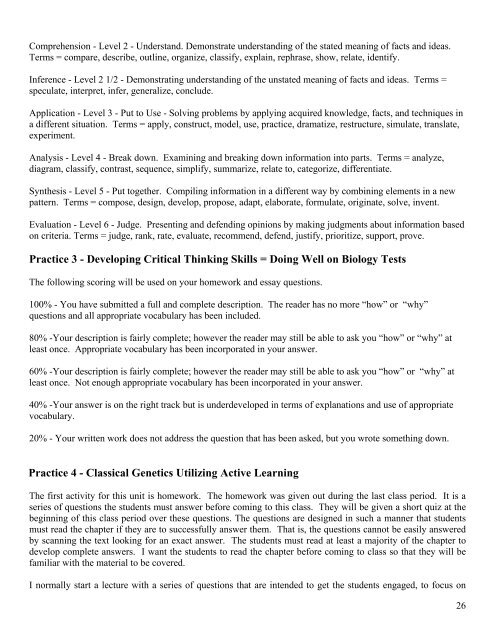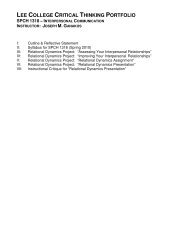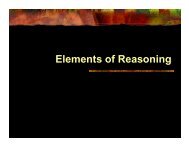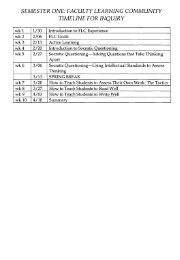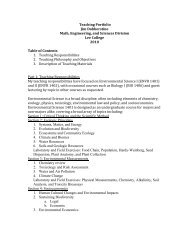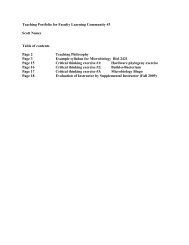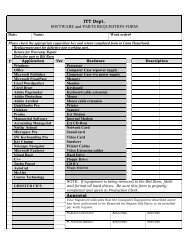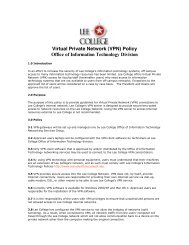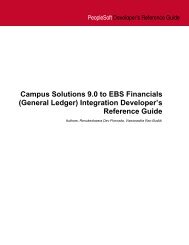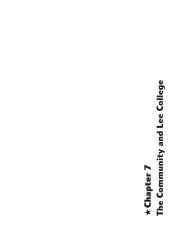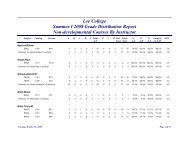Judy Lehmberg (FLC I) - Lee College
Judy Lehmberg (FLC I) - Lee College
Judy Lehmberg (FLC I) - Lee College
Create successful ePaper yourself
Turn your PDF publications into a flip-book with our unique Google optimized e-Paper software.
Comprehension - Level 2 - Understand. Demonstrate understanding of the stated meaning of facts and ideas.<br />
Terms = compare, describe, outline, organize, classify, explain, rephrase, show, relate, identify.<br />
Inference - Level 2 1/2 - Demonstrating understanding of the unstated meaning of facts and ideas. Terms =<br />
speculate, interpret, infer, generalize, conclude.<br />
Application - Level 3 - Put to Use - Solving problems by applying acquired knowledge, facts, and techniques in<br />
a different situation. Terms = apply, construct, model, use, practice, dramatize, restructure, simulate, translate,<br />
experiment.<br />
Analysis - Level 4 - Break down. Examining and breaking down information into parts. Terms = analyze,<br />
diagram, classify, contrast, sequence, simplify, summarize, relate to, categorize, differentiate.<br />
Synthesis - Level 5 - Put together. Compiling information in a different way by combining elements in a new<br />
pattern. Terms = compose, design, develop, propose, adapt, elaborate, formulate, originate, solve, invent.<br />
Evaluation - Level 6 - Judge. Presenting and defending opinions by making judgments about information based<br />
on criteria. Terms = judge, rank, rate, evaluate, recommend, defend, justify, prioritize, support, prove.<br />
Practice 3 - Developing Critical Thinking Skills = Doing Well on Biology Tests<br />
The following scoring will be used on your homework and essay questions.<br />
100% - You have submitted a full and complete description. The reader has no more “how” or “why”<br />
questions and all appropriate vocabulary has been included.<br />
80% -Your description is fairly complete; however the reader may still be able to ask you “how” or “why” at<br />
least once. Appropriate vocabulary has been incorporated in your answer.<br />
60% -Your description is fairly complete; however the reader may still be able to ask you “how” or “why” at<br />
least once. Not enough appropriate vocabulary has been incorporated in your answer.<br />
40% -Your answer is on the right track but is underdeveloped in terms of explanations and use of appropriate<br />
vocabulary.<br />
20% - Your written work does not address the question that has been asked, but you wrote something down.<br />
Practice 4 - Classical Genetics Utilizing Active Learning<br />
The first activity for this unit is homework. The homework was given out during the last class period. It is a<br />
series of questions the students must answer before coming to this class. They will be given a short quiz at the<br />
beginning of this class period over these questions. The questions are designed in such a manner that students<br />
must read the chapter if they are to successfully answer them. That is, the questions cannot be easily answered<br />
by scanning the text looking for an exact answer. The students must read at least a majority of the chapter to<br />
develop complete answers. I want the students to read the chapter before coming to class so that they will be<br />
familiar with the material to be covered.<br />
I normally start a lecture with a series of questions that are intended to get the students engaged, to focus on<br />
26


